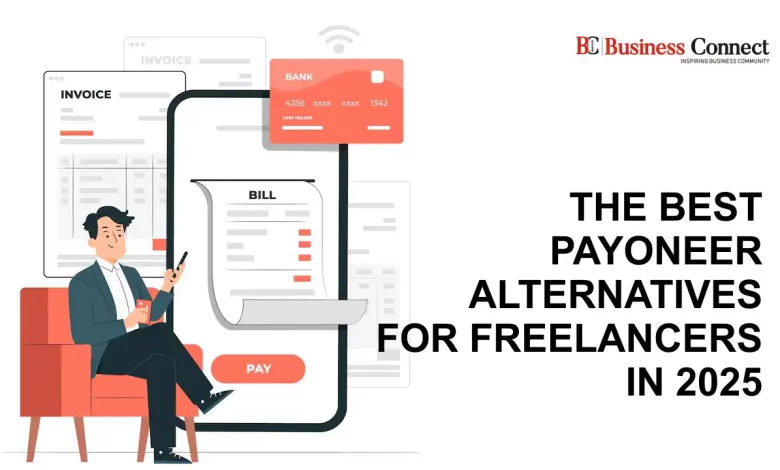The Best Payoneer Alternatives For Freelancers In 2025

Freelancing is now popular around the world. People involved in graphic design and web development now often work online and receive payment from anywhere in the world. Then again, choosing the most suitable payment platform can be complicated. For international payments, a lot of freelancers depend on Payoneer. But there are also other possibilities. Many services now provide quick, cheap, and secure ways to pay online. If you’re searching for Payoneer alternatives for freelancers, this guide will help you choose the best one.
Why Look for Alternatives to Payoneer?
Payoneer works for many, but there are still some problems. Several freelancers encounter expensive transaction fees, delays in receiving their earnings, or problems with language support in their home nation. Others want more control over exchange rates or better integration with their workflow. These issues have encouraged many to explore other platforms. Let’s look at what matters most when choosing a payment solution:
- Low transfer fees
- Fast processing times
- Currency conversion rates
- Global availability
- Ease of use
- Customer support
Based on these factors, here are the top alternatives to consider.
1. Wise (formerly TransferWise)
In the world of fintech, Wise enjoys a high level of deserved trust. It offers transparent fees and real mid-market exchange rates. Unlike Payoneer, Wise shows you the exact cost before you send money.
Pros:
- Real exchange rate with no hidden markup
- Multi-currency account support
- Fast international transfers
- Easy-to-use mobile app
Best for: Any freelancer processing payments in different currencies and looking to manage their money fully.
2. PayPal
PayPal is known as one of the earliest and most famous payment services online. Freelancers can use the platform to accept payments worldwide.
Pros:
- Global reach
- Trusted by businesses and individuals
- Quick transfers to bank accounts
Cons:
- Higher fees compared to some competitors
- Currency conversion charges
Best for: As a freelancer, working for companies that want you to use PayPal to accept payments.
3. Skrill
You can use Skrill to handle your finances in over 40 different currencies. Sending or receiving money is easy, fast, and works for people around the globe.
Pros:
- Low transfer fees
- Supports both bank and card transfers
- Cryptocurrency support
Cons:
- Not accepted on some platforms
- Account verification can take time
Best for: People who are freelancers and wish to use one wallet for varied tasks.
4. Revolut
Revolut combines banking with modern digital features. It offers a multi-currency account, a sleek mobile app, and competitive exchange rates.
Pros:
- Instant transfers between Revolut users
- Prepaid debit card included
- Expense tracking tools
Cons:
- Not available in all countries
- Monthly limits on free services
Best for: If you are a freelancer, you might like the digital banking system and handy budgeting functions.
5. Stripe
Many people who freelance and have their own websites or carry out online business prefer Stripe. The API is designed for developers, and multiple options are provided for payment methods.
Pros:
- Accepts card payments from clients globally
- Transparent fee structure
- Supports subscriptions and invoicing
Cons:
- Slightly complex setup for non-technical users
- May not suit one-off freelancers
Best for: Freelancers with online stores or recurring billing needs.
6. Deel
Deel was built for teams and freelancers from all over the world. Cryptocurrency helps shrink administrative work around file keeping, contracts, and funds transfers. You have the option to withdraw money through Payoneer, Wise, or your local bank.
Pros:
- Built specifically for freelancers
- Handles contracts and taxes
- Multiple withdrawal options
Cons:
- Mainly for freelancers working with companies that use Deel
- Not suitable for direct peer-to-peer payments
Best for: Freelancers with long-term clients who use Deel as a payroll solution.
7. Revolut Business
If you’re scaling your freelance work into an agency or team, Revolut Business offers tools for team payments, expense management, and budgeting.
Pros:
- Business-oriented features
- Integrated with accounting tools
- Multi-currency support
Cons:
- Monthly subscription required
- Fewer features in the free version
Best for: Freelancers running small teams or client-facing services with multiple payment streams.
Choosing the Right Payment Platform
There’s a varied approach to parenting. The type of work you do is affected by where you live, what your clients want, and your style of working. Let’s use this simple checklist to help you make a decision:
- Do you work with clients who prefer PayPal? Use PayPal or link it with Stripe.
- Need the lowest fees and real exchange rates? Wise is your best bet.
- Want a simple wallet with crypto options? Try Skrill.
- Selling products or subscriptions? Go with Stripe.
- Working with platforms like Deel or Upwork? Choose what integrates best.
Safety and Security
Security should be a top priority. All the platforms listed above use encryption, two-factor authentication, and fraud prevention tools. Always enable all security features and avoid logging in on public networks.
Conclusion
Payoneer remains a solid choice. But it’s wise to explore your options. Many freelancers now use a mix of platforms to manage their income efficiently. Anyone hoping for smaller charges, faster movement of money, or additional options can use Payoneer alternatives.
Check out several options, evaluate their results, and decide which one benefits your company most. As the freelancing world grows, so do your options for getting paid—on your terms.
Add Business Connect magazine to your Google News feed






